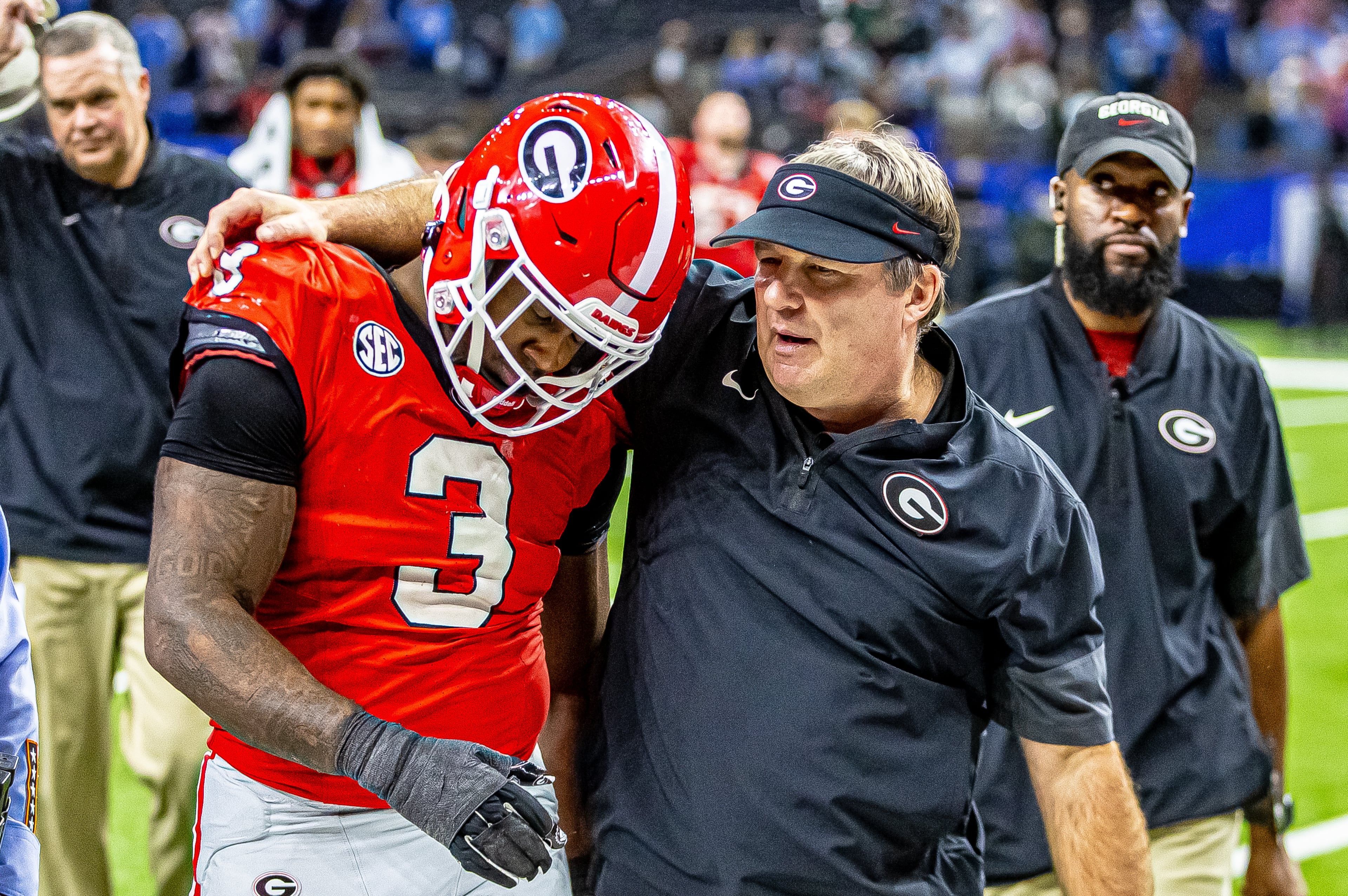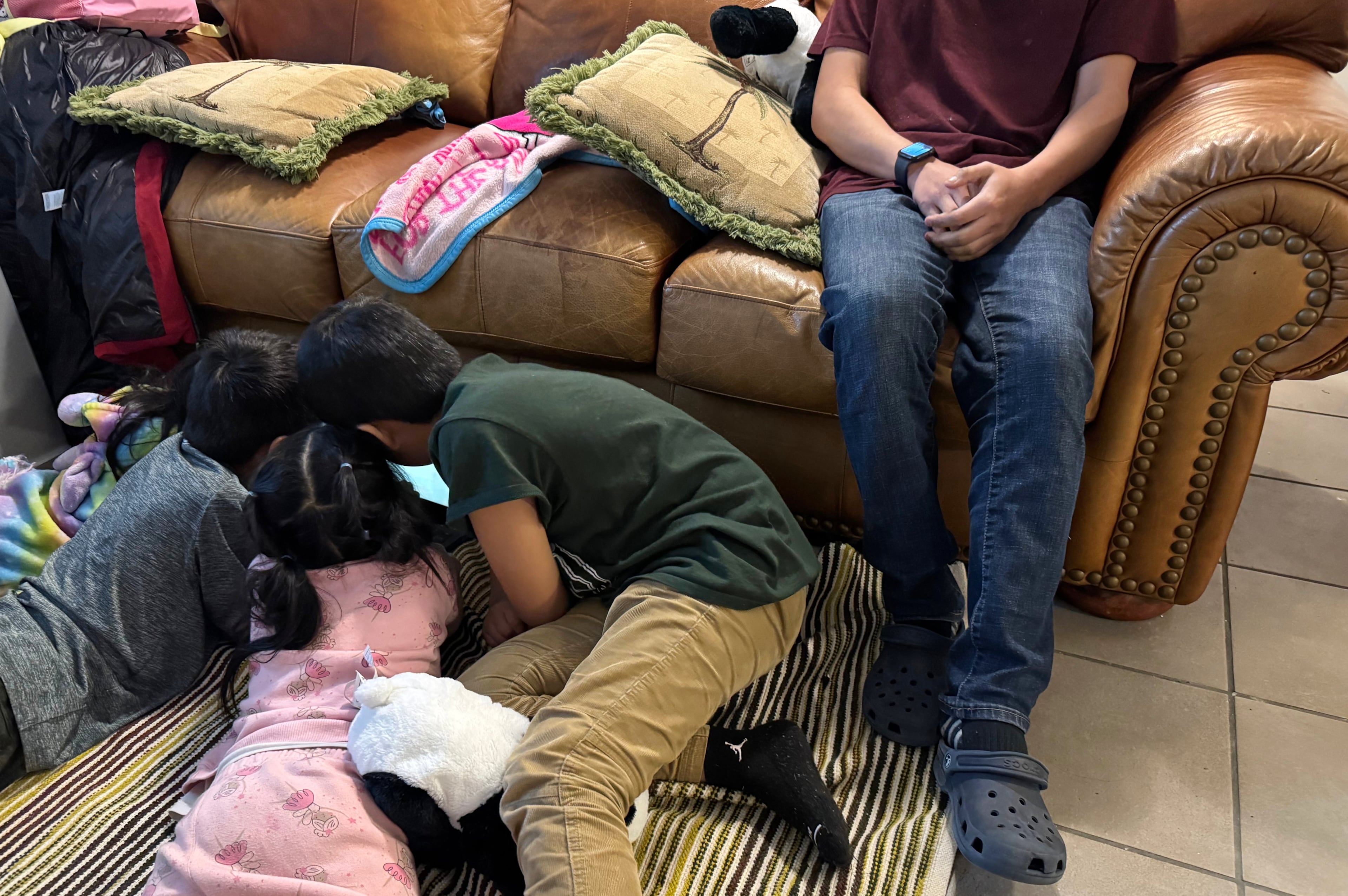This Atlanta suburb is drawing many immigrants from the border

Among the perils Joel faced on his journey to the southern U.S. border from his home in Nicaragua were violent gangs and Mexican law enforcement officials who demanded bribes to guarantee safe passage. After crossing onto American soil in late 2022, he spent several days in immigrant detention.
“It was a traumatic trip,” he said.
Joel’s current life feels worlds removed from his painful memories of migration. Once U.S. immigration officials released him from custody with a notice to appear in immigration court, Joel flew to Georgia, to join a cousin. Now, he is living with that relative in Lawrenceville, a quiet Atlanta suburb whose stately brick buildings illustrate the historic city’s role as Gwinnett’s county seat.
Although he lacked a work permit, Joel quickly found an opportunity to support himself working on furnaces and air conditioners in the HVAC repair sector.
The Atlanta Journal-Constitution isn’t using Joel’s full name because he wished to keep it private, to avoid impacting his immigration case.
Joel’s story isn’t unique.
As border officials registered record high numbers of illegal crossings in recent years before a 2024 slowdown, migrants settled in communities nationwide. Based on research by The Atlanta Journal-Constitution into the number of immigration court cases due to be heard in the coming months and years in Georgia, Lawrenceville appears to be a favorite destination for newcomers.
As of June, there were nearly 9,000 pending immigration court cases for people with Lawrenceville ZIP codes in their addresses, more than any other individual Georgia municipality. That’s according to an analysis of immigration court data by the Transactional Records Access Clearinghouse (TRAC), a research institute at Syracuse University.
County-level data compiled by TRAC underscore Gwinnett’s position on the frontlines of Georgia’s immigration influx. Starting in 2020, Gwinnett has led the state every fiscal year in the number of newly filed immigration cases, reaching over 10,000 in both 2023 and 2024. Lilburn, Chamblee, Doraville, and Norcross also account for some of the highest numbers of pending cases at the municipality level statewide.
Backlogs in the nation’s immigration court system currently allow most people to spend years in the U.S. before they have to come before a judge for a final decision on whether they can ward off deportation.
The number of new immigrants arriving from the border – who account for most new cases in immigration court – only tells part of the story of Lawrenceville’s and Gwinnett’s growing diversity, which has been decades in the making.
Even before the latest post-pandemic immigration surge, Lawrenceville was already one of Gwinnett’s many cities where minority residents outnumbered white residents. When the 2020 U.S. Census count was taken, 27.9% of the town’s roughly 30,000 residents identified as Hispanic, and 7.6% identified as Asian. That’s up from 22.5% and 5.6% in 2010, respectively. The demographics of Lawrenceville’s public schools indicate that growth is likely to persist in the future. In Lawrenceville’s sole high school, Central Gwinnett High, 37.9% of the student body is Latino. Multiple local elementary schools are upward of 60% Hispanic.
The school system’s International Newcomer Center, which helps welcome and orient immigrant families, is based in Lawrenceville.
According to Stacy Ehrisman, an immigration lawyer based in Lawrenceville, the presence of “established pockets” of various diaspora groups helps explain why newer arrivals choose to settle where they do. In Lawrenceville, she’s worked with many people hailing from Colombia, Mexico, El Salvador and Honduras. She has also noted an “exponential” increase in the number of new arrivals from Venezuela.
The go-to work opportunity for newcomers, especially able-bodied men, is in construction. But Ehrisman says undocumented workers in the field must often contend with wage theft.
“They’ll be hired as subcontractors. They’ll go out and do a job. And then they’ll be told, ‘Oh no, I’m not going to pay you, you’re illegal.’”
Joel says that he fortunately has no complaints when it comes to the treatment he has received by locals. He has been considering moving somewhere with a cheaper cost of living – he brought up South Carolina as an example – but says he would ideally want to stay in Lawrenceville because of how welcome he has felt.
“The people here aren’t racist,” he said.
‘We’re everywhere’
Marlene Taylor-Crawford is a Lawrenceville councilwoman and its current mayor pro tem. The daughter of immigrant parents from Jamaica and Cuba, she grew up and lived in Brooklyn before moving to the Lawrenceville area roughly 25 years ago. She says she has enjoyed seeing the community gradually reflect some of her hometown’s diversity levels.
“This is normal for me, seeing people from all over the world,” Taylor-Crawford said.
Compared to when she first arrived, Lawrenceville has a bevy of new international restaurants. There are more Hispanic grocery stores, more fútbol games in public parks, more Spanish-language ministries in local churches.
“We have to make sure that there is representation [in city leadership], so that it’s reflecting the residents in the community and everyone’s voices are being heard, whatever their ethnicity, their language, or their experiences,” Taylor-Crawford said.
On a recent Saturday, Taylor-Crawford and Captain Sal Ortega from the Lawrenceville Police Department attended the Primera Iglesia Bautista Hispana de Lawrenceville’s 22nd anniversary celebration, to show their support. A Hispanic Baptist congregation, the Primera Iglesia has grown exponentially in recent months, prompting it to seek a bigger gathering space. Roughly six months ago, the congregation began renting some of the facilities of Lawrenceville’s Central Baptist Church.
According to Rev. Ventura Ruiz, his church added 80 members during that time, going from 120 to 200.
There are 17 different nationalities represented in Ruiz’s congregation, with about 35% of members hailing from Venezuela. Many of them crossed the southern border after dangerous treks through the Darién Gap, a dense, lawless stretch of jungle connecting South and Central America.
“They had to face the jungle and they tell you about everything that they went through, about how people in their group died and they had to keep going,” Ruiz said. “They’re the kind of stories that make you say, ‘Wow.’”
Given the needs and vulnerabilities that those new to the country typically have, Ruiz says his church has a responsibility to also act as a social services provider.
There are food distributions every week, and free childcare. The church also works to connect people with low-cost clinics and immigration attorneys.
“We try to help with as much as possible,” Ruiz said. “People come to church because they are looking for God, but they have other needs too.”
The uptick in Venezuelan immigration observed by Ruiz and Ehrisman has also been noticed at La Liga Lawrenceville de Fútbol, a local Hispanic soccer league. Roberto Vargas, the league’s Mexican founder, says there are 14 majority-Venezuelan teams in the league. For context, there are a total of 40 adult teams, up from just a couple when the league was founded in 1996.

“All my respect to them, because they’ve literally had to risk their lives to get here,” Vargas said.
According to Vargas, securing playing time in public park pitches has been consistently difficult for his league since the 1990s, a challenge he ascribes to anti-Hispanic discrimination.
Non-Latino leagues and residents are given scheduling priority by Gwinnett County parks, Vargas said. His own league often has to make do with “leftover” time slots.
“It’s been very hard, just swimming against the current. The Hispanic community has been neglected when it comes to getting to use the fields. … We form part of Gwinnett County, we pay our taxes, we live here but we aren’t taken seriously,” Vargas said. “I think there has to be a change, we have to be accepted more as part of the community. At the moment, we sometimes feel like second class people.”
In a statement, Gwinnett spokesperson Deborah Tuff said the county does its best to ensure La Liga has a place to play.
“Liga Lawrenceville de Fútbol is one of several adult leagues we collaborate with across the county. With only 17 multipurpose fields, accommodating the needs of every group can be challenging,” she wrote. “We value our relationship with all park users and strive to provide the best service with every interaction.”
On occasion, the surge of new immigrants has also caused tension within members of the Latino community who have been long established in Lawrenceville.
Osmar Espinoza is 45, from Nicaragua. He has lived in Lawrenceville since 2000, where he works in tree trimming and removal.
“You can feel it, there are a lot of people coming in, and work is becoming more scarce,” he said. “There is more competition.”
As recently as two years ago, Espinoza said he used to have up to four straight weeks of work lined up at any given time. Now, he typically doesn’t know what work opportunities, if any, next week will bring.
Still, he says he is satisfied with life in Lawrenceville, and can’t imagine moving anywhere else. He likes the convenience of having everything he needs near his home, including a growing number of Hispanic restaurants and grocers.
“We feel like we are in our own countries, almost,” he said.
“Before, you didn’t see many Hispanic people around. Now, we’re everywhere. It’s like the older generations [of Lawrenceville residents] have been dissipating, and making way for us Hispanics to stay.”
Pending immigration court cases
By Georgia city, based on zip code of immigrants’ addresses:
- Lawrenceville: 8,848
- Lilburn: 7,843
- Chamblee-Doraville: 5,568
- Atlanta: 4,594
- Norcross: 4,555
Source: Syracuse University’s Transactional Records Access Clearinghouse (TRAC)




